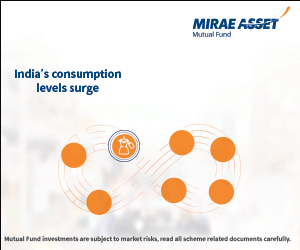SBI Savings Fund: Good short term investment option for investors

Current economic and market context
The global financial markets have been in extraordinary conditions for the past several months. Commodity prices have been very high across the world; crude oil prices are at 10 year high and expected to go up even further, as war rages in Ukraine.
Inflation in United States is at a 40 year high. Even in India, retail inflation (CPI) is at an 8 year high (source: Govt Data for April 2022). High inflation has spooked financial markets. Both equity and debt markets have been highly volatile. The 10 year Government bond yield in India is at multi-year high at more than 7.6%, expected to go up even further. Returns of longer duration debt mutual funds have been negative or closer to zero for the past one year.
Near term outlook on debt market
Inflation has been on the higher side, led by crude oil prices, for the good part of last 12 months. Initially central banks like US Federal Reserve, RBI etc thought that the high inflation is transitory. However, persistently high inflation has forced central banks to change their tune and adopt a more hawkish monetary policy stance. The US Federal Reserve has already hiked interest rates by 75 bps in 2022, while the RBI has hiked repo rate by 90 bps (as on 10th June 2022).
Recent data (as of last week) shows that inflation is showing no signs of cooling off, despite central banks’ rate hikes. Inflation in the US spiked up further and while the May 2022 CPI inflation in India was a tad bit lower at 7.04%, it is still way higher than RBI’s comfort levels. The headline inflation numbers point to more aggressive rate hikes by the central banks, which imply more volatility for investments at the longer end of the yield curve.
Short term rates are now quite attractive
The 364 day Treasury Bill yields are now quite attractive relative to traditional fixed income investments e.g. Bank Fixed Deposits. The 364 day T-Bill yield as on 3rd June is 6.08% (source: RBI), while the 1 year FD interest rates of major public and private sector banks are in the range of 4.5 - 5.1% (source: Bankbazaar.com).
In the current fixed income scenario, we think that money market debt mutual funds can be attractive investment options for investors with 1 – 2 years investment horizons. Based on the recently published US inflation data, we expect a substantially large Fed Funds rate hike in the next Fed meeting, which will have a cascading effect in India i.e. higher short term and long term yields. While banks may also increase term deposit interest rates, that increase is likely to come with a lag and to a lesser degree, because banks will also have to protect their margins. As such, we reiterate that money market funds can be good investment options for short term investors (1 – 2 years tenures) in current conditions.
Credit spreads are widening
As per CRISIL credit spreads are widening even for highly rated papers (AAA /AA). Between April and May, credit spreads widened by 6 – 7 bps for AAA/AA rated papers in 6 to 12 months maturity profiles. This spread is likely to widen as short term yields go up.
We think that SBI Savings Fund will be able to re-invest the proceeds of the maturing papers in their portfolios at incrementally higher yields, giving higher returns to investors.
What are money market funds?
Money market funds are fixed income mutual fund schemes which invest in money market instruments having maturity of up to 1 year. Tri-party repos (TREPs), Treasury Bills, Commercial Papers (CPs), and Certificates of Deposits (CDs) etc are money market instruments. The risk profile of these schemes is higher than overnight, liquid and ultra short duration funds, but lower than longer duration funds (e.g. short duration funds, medium duration funds, long duration funds etc).
Money market funds usually use accrual investment strategy i.e. they hold the debt and money market instruments in their portfolio till maturity. If you have an accrual strategy, interest rate changes will have no effect on your returns. The value of your portfolio may fluctuate but on maturity you will get the accrued interest and the principal; so your return can be quite predictable in line with the yield (YTM) of the instrument.
About SBI Savings Fund
SBI Savings Fund was launched in 2004 and has nearly Rs 21,864 crores of assets under management (AUM). The expense ratio of the scheme is only 0.76%. Mr R. Arun has been managing this scheme for the last 10 years. The scheme has given north of 7% CAGR returns since inception.
The investment strategy would be towards generating stable returns through a portfolio of Money Market instruments seeking to capture the term and credit spreads. The chart below shows the performance of SBI Savings Fund versus S&P BSE Liquid Rate Index. You can see that SBI Savings Fund was able to give higher returns than liquid funds by investing in the right portion of the yield curve and capturing credit spreads.

Source: Advisorkhoj Research
Why invest in SBI Savings Fund?
SBI savings fund has an average maturity of 0.41 year and modified duration of 0.39 year. This means that the scheme has limited interest rate risk. Even interest rates go up 100 bps in the next 6 – 12 months the effect on scheme return will be only -0.39%. If the instruments are held till maturity, then interest rate changes will have no impact on scheme returns.
The current yield to maturity (YTM) of the scheme is 5.58% and is likely to go up in the future, as the scheme re-invests proceeds of maturing instruments at higher yields. The credit quality of the scheme is very high – 95% of the papers are either sovereign or rated A1+ (highest credit rating for money market instruments).
Who should invest in SBI Savings Fund?
- Investors who have investment tenures of at least 1 year can invest in money market funds.
- Investors who want income with relatively low volatility over longer investment tenures can also invest in money market funds.
- If you want to invest in an equity fund but are worried about short term volatility, you caninvest in SBI Savings Fund and transfer through Systematic Transfer Plan from this fund to the equity fund of your choice. In this way, you can get more liquidity and returns from the money market fund and take advantage of the equity fund volatility through rupee cost averaging. Money market funds are suitable for STPs because they are less volatile than longer duration funds.
Investors should consult with their financial advisors if SBI Savings Fund is suitable for their investment needs.
Mutual Fund Investments are subject to market risk, read all scheme related documents carefully.
Queries
-
What is the benefit of mutual fund STP
Aug 29, 2019
-
How much to invest to meet target amount of Rs 2 Crores
Aug 26, 2019
-
Can I achieve my financial goals with my current mutual fund investments
Aug 24, 2019
-
Can you tell me return of various indices
Aug 19, 2019
-
What would be the post tax return on different investments
Aug 18, 2019
-
Which Principal Mutual Fund scheme will be suitable for my retirement corpus
Aug 16, 2019
-
What is the minimum holding period for availing NCD interest
Aug 4, 2019
Top Performing Mutual Funds
Recommended Reading
Fund News
-
Edelweiss Mutual Fund launches Edelweiss BSE Internet Economy Index Fund
Apr 25, 2025 by Advisorkhoj Team
-
Bajaj Finserv Mutual Fund launches Bajaj Finserv Nifty 50 Index Fund
Apr 25, 2025 by Advisorkhoj Team
-
SBI Mutual Fund launches SBI Income Plus Arbitrage Active FOF
Apr 23, 2025 by Advisorkhoj Team
-
Motilal Oswal Mutual Fund launches Motilal Oswal Infrastructure Fund
Apr 23, 2025 by Advisorkhoj Team
-
Groww Mutual Fund launches Groww Gilt Fund
Apr 23, 2025 by Advisorkhoj Team













